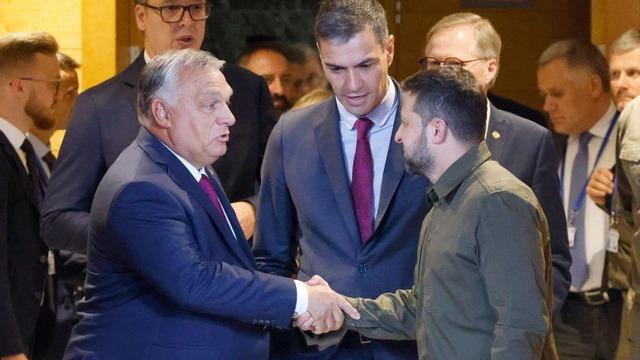Ambassadors of 27 EU member states reached an agreement in principle on the framework for accession negotiations on Friday evening.
HUNGARY TAKES A STEP BACK
Hungary, which had previously taken a negative stance on Ukraine’s EU membership and threatened to veto it, also took a step back and supported this decision.
There was no objection from Hungary at the meeting of EU Ambassadors on Friday evening.
Belgium, whose EU Presidency will end on June 30, announced that the first intergovernmental conferences with Ukraine and Moldova will be held on June 25.
The EU Presidency will pass to Hungary as of July 1. The Viktor Orban administration, which will hold this position until December 31, will have a significant influence on determining the political agenda.
The EU Commission wanted to start full membership negotiations with Ukraine under Belgium’s term presidency “in order to eliminate the Orban risk”.
The EU Commission announced last week that Ukraine and Moldova met all the conditions to start negotiations for full membership in the European Union.
According to the Commission, these two candidate countries have made a concerted effort to meet all the conditions put forward by Brussels.
According to the EU leadership, Ukraine has taken measures to fight corruption, introduced more restrictions on political lobbying and better protection of minority languages, which has caused a reaction from Hungary.
In addition to fighting corruption, Moldova has also taken steps to reform the legal field.
Belgium will hold two intergovernmental conferences with Ukraine and Moldova during the EU General Affairs Council in Luxembourg on 25 June. Thus, the two countries’ journey to EU membership will officially begin.
MEMBERSHIP IS A LONG PROCESS
However, this is a process that may take many years. It can sometimes take up to 10 years for a candidate country to become a de facto EU member.
Although there is now a consensus on starting negotiations, the veto threat of member states may come to the fore again during the bargaining process.
Before the full membership process, Ukraine and Moldova must take many steps that require new approval from all EU members and all issues must be negotiated in detail.
Croatia last joined the EU as a full member in 2013. Particularly far-right parties were not keen on the expansion of the union.
WHY WAS UKRAINE’S EU MEMBERSHIP PROCESS ACCELERATED?
Previously, European public opinion had reservations about Ukraine’s relations with the EU, especially due to corruption.
In the referendum held in the Netherlands in 2016 on the EU Association Agreement with Ukraine, 61 percent voted no.
Opponents, including far-right Geert Wilders, currently the leader of the largest party in the Netherlands, opposed the association agreement with Ukraine on the grounds that “a country that has problems with Russia and is mired in corruption and instability will bring new problems to Europe.”
However, Russia’s invasion of Ukraine changed the perspective in Europe.
Ukrainian President Vlodomir Zelenskiy applied for full membership to the EU on February 28, 2022.
In a record short time, the EU Council accepted Ukraine’s application and granted candidate member status on June 23, 2022.
EU leaders decided to start membership negotiations with Ukraine and Moldova at the summit held in Brussels on December 14, 2023.
During her visit to Kiev at the end of last year, EU Commission President Ursula von der Leyen said that Ukraine had carried out reforms at a surprising pace and met 90 percent of the conditions requested by Brussels.
Starting negotiations with a country at war for the first time is considered a clear political message to Russia under Vladimir Putin.
According to sources in Brussels, full membership is not a process that will happen overnight. However, by initiating negotiations, the EU administration wants to give the message to Russia that “Ukraine is a part of the European family and we will not leave it alone.”
Moldova’s membership process is likewise considered as a message to the Putin administration.
WHY DID HUNGARY OPPOSE UKRAINE’S MEMBERSHIP?
While the majority of EU countries fully supported Ukraine regarding full membership, the strongest opposition came from Hungary under the Orban administration.
Viktor Orban stated that he was against the start of negotiations with Ukraine, which he called “the most corrupt country in Europe”, and threatened to veto.
According to sources in Brussels, there were two main reasons for this; The Orban administration’s pro-Russian stance and its view that the Kiev administration is violating the rights of the Hungarian minority in Ukraine.
After Hungary had to transfer its lands to neighboring countries after World War I, some of its population began to live in Ukraine.
According to Hungary, the Ukrainian administration ignored the rights of the Hungarian minority, especially the issue of their native language.
The Orban government stated that it would not approve Ukraine’s membership unless the problems regarding the rights of the Hungarian minority are eliminated.
With the initiative of the EU administration, the Ukrainian administration has implemented a series of legal regulations to improve minority rights.
According to sources in Brussels, these regulations, as well as the efforts of the EU administration, had an impact on convincing the Orban administration.

